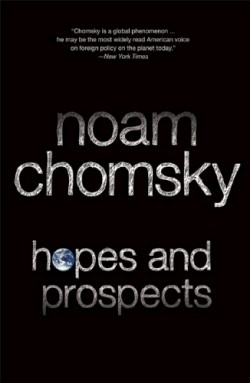Hopes and Prospects
In Hopes and Prospects, Noam Chomsky’s gritty, politically charged essays redefine the nature and practice of democracy in an increasingly unsteady world climate. Chomsky reinterprets the long held ideal that “expansion is the path to security” and reveals a set of unexpected hopes for the future of democracy.
South America, Chomsky says, “is the threat of a good example,” and the first half of this collection explores the rise of Latin America as an emerging independent power. The turbulent continent is spotlighted as a possible inspiration to both struggling and privileged nations aiming to champion the cause of social justice, human rights, and ultimately the true practice of democracy. These essays do something entirely new: they hinge the political power and financial security of the United States on the prospect of a free and unfettered South American continent driven forward by grassroots initiatives. Supported by extensive political and historical research, the essays turn a critical eye on popular topics, retraining the reader to assess familiar themes in new ways. Globalization, US foreign policy, democracy, and independence are visited through the lens of a changing South America and the important role it will play in future world developments.
The second half of the book focuses on North America, its current entanglements, and the Obama administration’s current stand on pressing international issues. Chomsky, known internationally for his dissident views and extensive criticisms of American foreign policy, moves beyond a simple flogging of American actions and instead provides an in-depth, focused analysis of the US invasion of Iraq and Afghanistan, its longstanding support of Israel, and the prospect of a nuclear arms race. Chomsky’s commentary is razor sharp and offers a compendium of facts that make a well-supported—and undoubtedly controversial—claim of the incongruity between US actions and the democratic ideals it professes.
Like his previous bestselling titles, Hegemony or Survival and Failed States, Chomsky’s latest book rightly demands an informed reader. However, a few key political events are glossed over fairly quickly on the assumption that the reader is already familiar with them. The book would benefit from a careful summation of events that may be unknown to a reader approaching the topic for the first time.
A valuable resource for both academics and everyday concerned citizens, this book aims to arm the reader with information and facts that will inspire “direct participation in action”—the kind of democracy that will benefit the public and result in real and positive change.
Disclosure: This article is not an endorsement, but a review. The publisher of this book provided free copies of the book to have their book reviewed by a professional reviewer. No fee was paid by the publisher for this review. Foreword Reviews only recommends books that we love. Foreword Magazine, Inc. is disclosing this in accordance with the Federal Trade Commission’s 16 CFR, Part 255.

